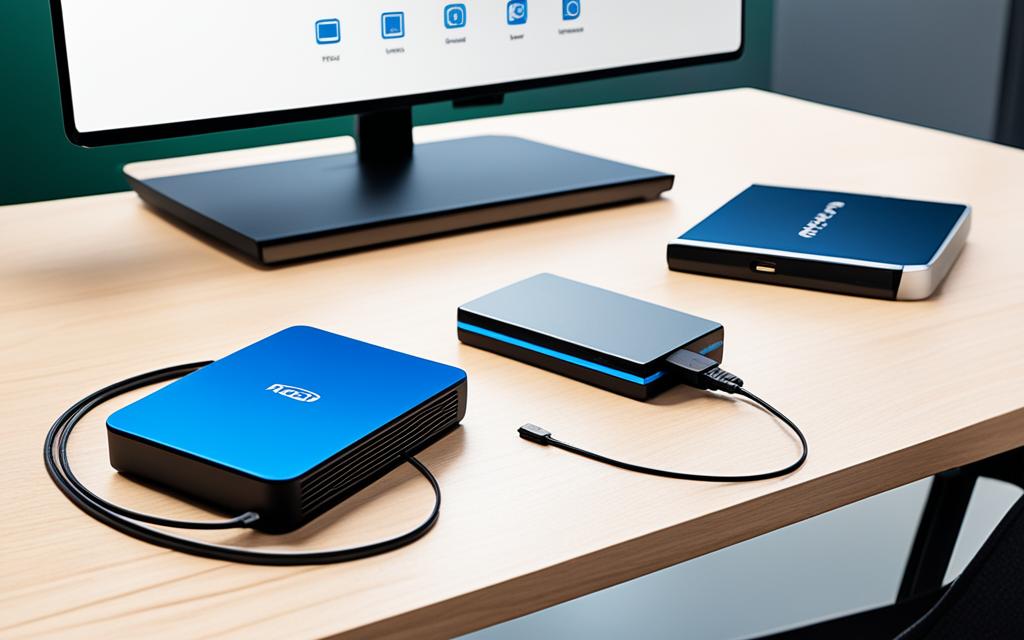Table of Contents
Today, portable HDDs are crucial for both personal and work use. They allow us to store a lot of data and back it up while moving. These external drives let us save and get to our digital things easily. They change how we handle our data. Knowing how they work helps us choose the best way to store our files. Amazingly, you don’t need an extra power source for portable HDDs. They run through a USB port, so you can use them anywhere at any time1.
What’s more, these drives can hold big files and backups, with some able to store up to 6TB2. As we use more digital data, the importance of having easy and secure access with portable HDDs grows.
Key Takeaways
- Portable HDDs are essential for on-the-go data storage and backup.
- They typically do not require an external power source, enhancing portability.
- Select models can provide capacities up to 6TB for storing large files.
- Understanding functionalities aids users in making informed storage decisions.
- Modern portable drives continue to offer competitive transfer speeds and data security.
What is a Portable HDD?
A Portable HDD is like a travel buddy for your data. It’s small and lets you carry loads of files everywhere. You can use it for both your personal stuff and work things.
The Definition and Functionality
The main point of a portable HDD is that it’s light but can hold lots. It’s made for being on the go. These devices can store up to 4TB, but some even go as high as 20TB34. They make moving data around easy without slowing down.
Portable HDDs let you manage your files simply. Drag and drop what you need. They are also pocket-friendly because they don’t use much power4.
How They Work
Let’s look at how portable HDDs work. They have spinning disks inside to store info. You connect them through a USB port. This cable does two jobs: it transfers data and powers the drive35.
These drives are quiet and use little energy. They come in tough cases to protect your data. This makes them trustworthy companions for your information.
| Aspect | Portable HDD | External HDD |
|---|---|---|
| Typical Capacity | Up to 4TB | Up to 20TB |
| Speed | 5400 RPM | Higher performance |
| Design Purpose | Mobility and occasional drops | Stationary and long-term storage |
| Lifespan | 5-10 years | 5+ years |
| Durability | Designed for portability | Generally bulkier |
Here, you see the differences and benefits between portable and external hard drives. Each type has its role in storing data3.
Benefits of Using Portable HDDs
Portable HDDs offer many benefits that suit both personal and work needs. They provide an easy way to store data and take it wherever you go. Knowing their advantages can help you choose the right storage solution.
Transportability
One great thing about external drives is how easy they are to carry around. They are small and light, making them perfect for people who travel a lot. Whether you’re a working professional or a student, you can easily take large files with you.
Their size makes them perfect for sticking into bags as a backup. This makes them a top choice for portable storage.
Data Backup and Security
Another major plus is the backup security portable HDDs offer. They allow you to make extra copies of important files. This helps prevent loss if something goes wrong, like a computer crash.
Since they’re physical devices, they’re less likely to be hacked than online storage. They keep personal or sensitive data safe. A Backup Rotation Scheme shows that using these drives is a secure way to back up data.
Storage Capacity Options
Portable HDDs come in various sizes, from 500GB to 20TB. This range means there’s something for everyone, from students to professionals. It’s important to pick a drive with enough space for your needs.
Larger drives support big projects, and swift transfer speeds make backing up quick. This helps you stay within budget while getting the storage you need.
| Capacity (TB) | Typical Use Case | Estimated Cost |
|---|---|---|
| 0.5 | Document storage and file transfer | Approx. £50 |
| 2 | Media libraries and gaming | Approx. £80 |
| 4 | Data backups for professionals | Approx. £120 |
| 6+ | Extensive project files and archives | Varies; typically £200+ |
Types of Portable HDDs
It helps to know the different types of portable HDDs when you’re looking for good storage. There are two main kinds: 2.5-inch drives and 3.5-inch drives. Each has its benefits, depending on what you need.
2.5-inch vs. 3.5-inch Drives
2.5-inch drives are small and light. They don’t need their own power source, which makes them easy to carry around. They’re perfect for daily use, like keeping photos safe or moving files around.
3.5-inch drives have much more space, up to 16 TB. They are faster because they spin more quickly, but they need an external power source. This makes them bigger and not so easy to take with you. But they’re great for people who have a lot of files and want speed.
When choosing a portable HDD, think about what’s important to you. Do you want something light and easy to carry, or do you need lots of space and speed? Each type has its advantages for keeping your data safe6.
Choosing the Right Portable HDD
Choosing the right portable HDD means looking at many things to make sure it works well for you. Understanding what to look for will help you find an external drive that matches your storage needs.
Factors to Consider
Here are things to think about when picking a portable HDD:
- Capacity: Think about how much space you need. Sizes range from 1TB to 20TB. Larger ones are great for lots of videos and data.
- Portability: For those who travel often, a lighter 2.5-inch drive is good. Consider its weight and size for carrying around.
- Speed: Look at how fast data moves. While HDDs are usually fast enough, SSDs are faster, making comparisons important.
- Connection Type: Most use USB, like Micro-B USB 3.0 or Type-C. This ensures they work with your devices. Some have Thunderbolt for faster transfers.
- Price: Costs vary a lot. For instance, a 1TB drive may be about $50, whereas a solid-state one might cost more7.
Comparison with Other Storage Solutions
Comparing to other storage can help too. SSDs are quicker and more reliable but cost more per gigabyte. A 4TB SSD might be over $500, unlike cheaper HDDs with the same space. Yet, HDDs offer good value for a lower budget7.
Cloud storage lets you access files remotely and backs them up automatically. However, it might bring extra costs and security concerns. Comparing HDDs and cloud storage helps make a better choice.
With many options like Western Digital and LaCie, taking these aspects into account helps pinpoint the best portable HDD. The right choice boosts your digital activities and keeps your data safe89.
Conclusion
Understanding portable HDDs can really help you when you need to store your data. These external drives are great because they’re easy to carry and keep your data safe. They offer lots of space, from 500MB to more than 5TB10. Your choice depends on what you need, like storing lots of videos or having a secure backup.
External drives are good for your wallet and give lots of storage space10. They’re also sturdier than USB sticks, which means your data is safer from drops and knocks11.
As technology moves forward, portable HDDs remain a top choice for keeping your data accessible and safe. It’s important to think about how these devices can help keep your files organised and secure for the future.
Want to know more about hybrid hard drives? Check out this detailed guide for more information.
FAQ
What are the primary uses of a Portable HDD?
Portable HDDs are great for storing data. They let you back up important stuff, move big files, and keep essential documents safe.
How do I connect a Portable HDD to my device?
It’s easy to connect a Portable HDD. Just use a USB cable. They work right away without needing extra power or setup.
What should I consider when selecting a Portable HDD?
Think about how much storage you need, how easy it is to carry, how fast it transfers data, and if it works with your devices.
Are Portable HDDs safe for data storage?
Yes, Portable HDDs are safe for keeping data. They’re good for offline backups, protect against cyber threats, and help you get data back if something goes wrong.
What are the differences between 2.5-inch and 3.5-inch Portable HDDs?
2.5-inch drives are small and light, good for carrying around. 3.5-inch drives have more storage but need their own power source.
How do Portable HDDs compare with SSDs and cloud storage?
SSDs are quicker and tougher but cost more. Cloud storage lets you access files from anywhere but has risks like hacking and ongoing fees. Portable HDDs offer direct, offline storage.
What storage capacities are available for Portable HDDs?
You can find Portable HDDs from 500GB to 20TB. Smaller ones are good for basic needs. Big ones suit professionals with lots of media or big projects.
Can I use a Portable HDD for both Mac and Windows systems?
Yes, you can use a Portable HDD with both Mac and Windows. Just make sure it’s formatted right (exFAT or NTFS) for both to work smoothly.
What is the average lifespan of a Portable HDD?
Portable HDDs usually last 3 to 5 years. How long depends on how you use and take care of them. Good care means they last longer.
Source Links
- https://www.securedatarecovery.com/blog/difference-portable-and-external-hard-drives – What Is the Difference Between Portable and External Hard Drives?
- https://www.westerndigital.com/solutions/hard-drives/portable-hdd – Compare Portable HDDs | Western Digital
- https://www.geeksforgeeks.org/difference-between-portable-and-external-hard-drives/ – Difference Between Portable and External Hard Drives – GeeksforGeeks
- https://www.partitionwizard.com/partitionmagic/external-hdd-vs-portable-hdd.html – Portable HDD vs External HDD: Compare Them and Choose One
- https://www.lenovo.com/us/en/glossary/external-hard-drives/ – External Hard Drives: Your Guide to Buying an External Hard Disk
- https://www.digitaltrends.com/computing/how-to-buy-an-external-hard-drive/ – How to Choose an External Hard Drive | Digital Trends
- https://www.lifewire.com/before-you-buy-external-hard-drive-6665942 – How to Choose an External Hard Drive
- https://www.pcmag.com/picks/the-best-external-hard-drives – The Best External Hard Drives for 2024
- https://www.techradar.com/news/best-external-desktop-and-portable-hard-disk-drives – Best external hard drives of 2024
- https://www.paklap.pk/blog/post/what-is-an-external-hard-drive-and-why-do-we-need-one – What is an External Hard Drive And Why Do We Need One?
- https://www.mediaduplicationsystems.com/blog/the-ultimate-guide-external-hard-drive-vs-usb-flash-drive/ – The Ultimate Guide: External Hard Drive vs. USB Flash Drive












